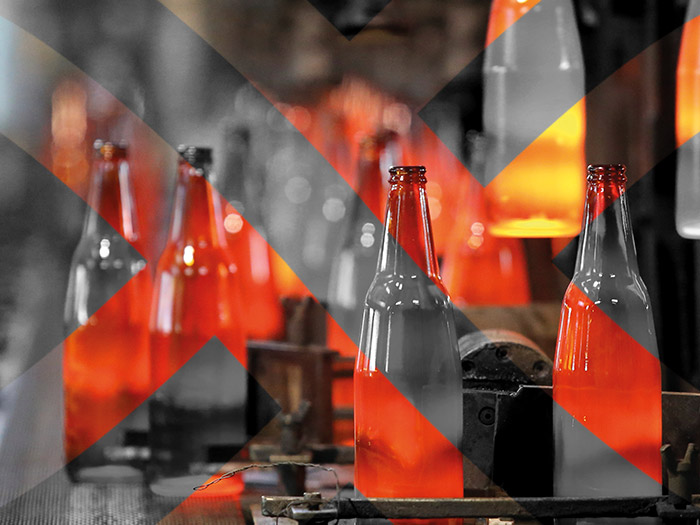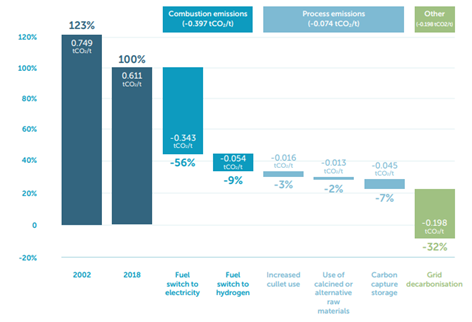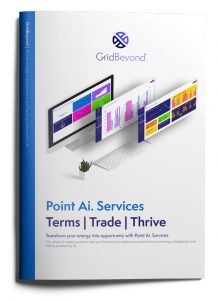News
better business decisions
Posted 4 years ago | 5 minute read

British Glass outlines 2050 Net Zero Strategy
British Glass has published a road map for the industry to reach net zero by 2050, based on renewables, hydrogen, CCS, and greater recycling levels.
Glass is set to play an increasingly critical role in the UK’s green economy as a core material for use in solar panels, wind turbines, insulation, double and triple glazing, and lighter-weight road vehicles. But the sector is energy intensive and largely reliant on fossil fuels.
Published on 19 July, British Glass unveiled its vision for a net zero glass manufacturing chain by 2050, with the publication of a major new strategy focused on shifting to renewable electricity and hydrogen fuels, increasing glass recycling, and harnessing carbon capture and storage.
The Net Zero Strategy aims to reduce combustion emissions for the sector by 0.397 tCO2/t, process emissions by 0.074 tCO2/t and other emissions by 0.198 tCO2/t. It outlines the options to enable glass manufacturers to meet these targets, as well as improving energy efficiency and support other sectors to decarbonise.

It sets out both the potential to switch furnaces to run either on renewable electricity or harness hydrogen as an alternative fuel. According to the document, large scale industrial demonstration of oxyfuel hybrid furnaces capable of running on up to 80% electricity enables this technology to be adopted in the container glass sector. Hybrid furnaces with a lower electricity input could be utilised by the flat glass sector and some smaller furnaces (<250 t/d) are converted to all-electric.
But it cautioned that improvements to the electricity grid, government support for upgrading site connections and policies on electricity pricing for large industrial users enable the sector to gradually transition are required.
Hydrogen may also be a viable option to replace natural gas for plants and processes where switching to electricity is not possible. Hydrogen would need to be Green Hydrogen or it would just transfer the carbon emission elsewhere, meaning that this hydrogen fuel would be created by using electricity from renewable sources such as wind, solar or hydro instead of fossil fuels. Under the plan, hydrogen is initially available inside the clusters by 2030 and the hydrogen network is extended to reach all glass sites by 2050. Sites using hybrid furnaces gradually transition to hydrogen from natural gas as it becomes available.
British Glass also said improvements in glass container recycling rates could also play a key role in driving down emissions, alongside greater research into using alternative raw materials that could enable sites to replace some raw materials in the manufacturing process.
GridBeyond’s CEO and Co-founder, Michael Phelan, commented:
“Crucially this strategy mentions little about the glass sector’s potential to support the nation’s transition to net zero by providing balancing services to the grid that support higher integration of renewables. At GridBeyond we are supporting glass manufacturers to do just that.
“From supporting you with flexible procurement, installing on site batteries to secure production resilience and gain revenue from energy markets, while supporting the UK’s transition to a net zero economy, GridBeyond finds opportunities in energy usage for savings, revenues, and sustainability.
“Using our AI-powered technology, we find the flexibility on your site and make it work for your business,, reducing operating costs and carbon emissions and securing revenue for your business.” To alleviate legitimate concerns of large energy users over energy pricings, our new Ai. Services enables Robotic Trading that monitors in real-time 70 plus data inputs combined with data from your sites. Our AI forecasting solution, Point Ai. Trade, uses advanced trading strategies, analytics-driven decision support and chooses the best opportunity to buy or sell energy on site in the energy markets or balancing services ”
Client Spotlight
GridBeyond works with the leading global glass manufacturers to boost sustainability and profitability. We worked with Ardagh to gain international sustainability recognition and awards.

Project Facts
- 12 MW of flexibility participating in demand side response programmes.
- 2MW battery installation
- 4 sites connected to GridBeyond’s hybrid battery and demand network.
- 65% increase in on-site flexibility when connected to the hybrid network.
Ardagh Benefits
- Reduced Carbon Footprint
- Optimised efficiency
- Future Proofed Flexibility
- Energy monitoring & reporting
- Fully Financed Installation
- No Risk To Operations
- Guaranteed Triad Avoidance
- Enhanced site resilience
“GridBeyond’s technical expertise and drive to innovate are the reasons we chose to start working with them on demand side response projects. Their ability to drive energy technology forward, met with Ardagh’s objective to use technology to pave the way in manufacturing sustainability, meant the partnership made perfect sense.”
Bishwa Giri – Energy Manager Glass Europe, Ardagh Group
Read more about how we have supported Ardagh to boost sustainability and profitability – https://gridbeyond.com/lp/client-spotlight-ardagh-group/
Our services for the glass industry
Using AI and Robotic Trading combined with the expertise of our trading experts and Data Scientists, GridBeyond’s Point Ai. Services open the door for your business to take your energy strategy from passive purchasing and consumption to predictive analysis and active energy management and trading. GridBeyond’s Point Ai. Services consist of three complementary products: Ai. Terms, Ai. Trade & Ai. Thrive, which together, will transform your energy into opportunity.

If you have any questions around the potential for your site, contact our team, or to learn more about the complimenting services offered by GridBeyond’s intelligent energy platform, our Point Ai. Services brochure.







